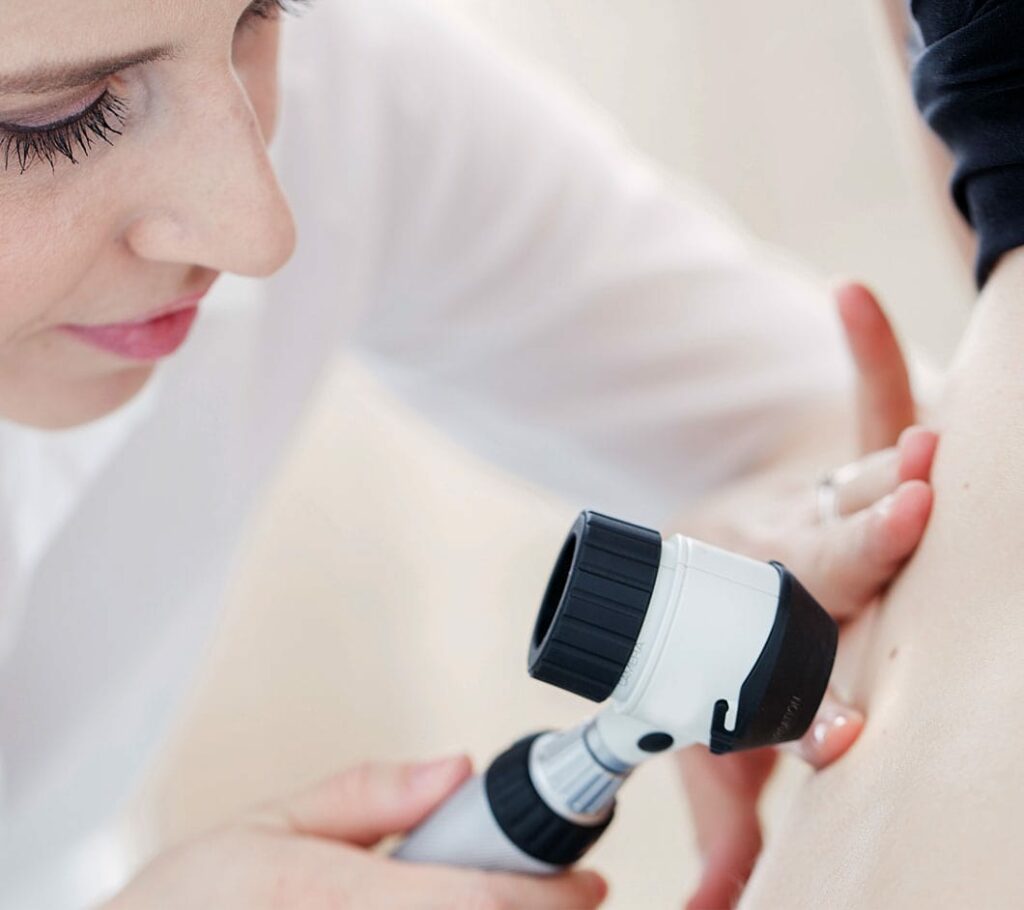Skin Cancers
Skin cancers occur when skin cells are damaged, for example, by overexposure to ultraviolet (UV) radiation from the sun.
There are three main types of skin cancers:
- Basal cell carcinoma
- Squamous cell carcinoma
- Melanoma
Both basal cell carcinoma and squamous cell carcinoma are known as non-melanoma skin cancer. Exposure to UV radiation causes 95% of melanomas, the deadliest form of skin cancer.
Get in touch with Dr Ballieux
Types of skin cancers
Basal cell carcinoma
Basal Cell Carcinoma are the most common and least dangerous skin cancer.
Superficial BCC is one type of Basal Cell Carcinoma that can look like small patches of dry skin or raised lumps on the skin. They often appear shiny, pink or redressed patches that enlarge slowly over months or years.
Squamous cell carcinoma symptoms
SCC accounts for about 30% of non-melanoma skin cancers.
It begins in the upper layer of the epidermis and usually appears where the skin has had most exposure to the sun (head, neck, hands, forearms and lower legs).
SCC generally grows quickly over weeks or months. Symptoms of SCC may include:
- Thickened red, scaly spot
- Rapidly growing lump
- Looks like a sore that has not healed
- May be tender to touch.
Melanoma
Melanoma is a type of skin cancer which usually occurs on the parts of the body that have been overexposed to the sun. Rare melanomas can occur inside the eye or in parts of the skin or body that have never been exposed to the sun.
The risk of being diagnosed with melanoma by age 85 is 1 in 13 for men compared to 1 in 22 for women.
Often melanoma has no symptoms, however, the first sign is generally a change in an existing mole or the appearance of a new spot.
New moles and spots will appear and change during childhood, adolescence and during pregnancy and this is normal. However, adults who develop new spots or moles should have them examined by their doctor.
Melanoma risk is increased for people who have:
- Unprotected sun exposure
- History of childhood tanning and sunburn
- Short, intense periods of exposure to UV radiation
- Increased numbers of unusual moles (dysplastic naevi)
- Depressed immune systems
- Familial history of melanoma in a first degree relative
- Fair skin, a tendency to burn rather than tan, freckles, light eye colour, light or red hair colour
- Personal history of melanoma
Symptoms
The sooner a skin cancer is identified and treated, the better your chance of avoiding surgery or, in the case of a serious melanoma or other skin cancer, potential disfigurement or even death.
Become familiar with the look of your skin, so you pick up any changes that might suggest a skin cancer.
Look for:
- Any crusty, non-healing sores
- Small lumps that are red, pale or pearly in colour
- New spots, freckles or any moles changing in colour, thickness or shape over a period of weeks to months.
Treatments of skin cancers
Treatments are divided into two main types.
Treatment of an area
Treating both visible and invisible lesions in an area damaged by the sun. A gel or a cream (Aldara, Efudix) can be used for the precancerous skin lesions.
Treatment of the lesion
The surgical excision is performed under local or general anaesthesia depending on the site and the size of the lesion. This treatment can include the use of a skin graft or a local flap to cover the defect.

Skin cancers : protect yourself
- Use Sunscreens that block both UVA and UVB rays (SPF 50)
- Wear lightweight clothing that covers your skin
- Look for clothing labelled with a UV protection factor of 50 +
- Wear a hat and sunglasses
- Protect your children from the sun in the same way
- Avoid the sun in the middle of the day
- Don’t use sun lamps or tanning booths
We worked together at the children’s hospital Westmead. Dr Ballieux is a passionate doctor.
Martin Gott
Get in touch with Dr Ballieux about skin cancers

